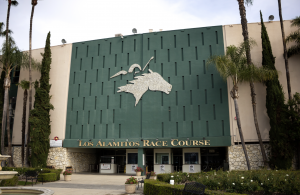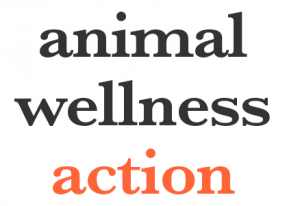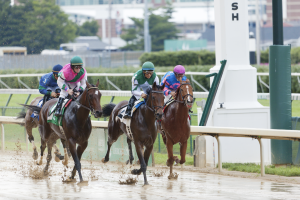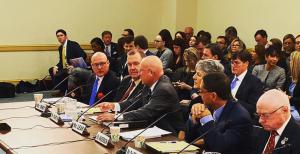Animal Wellness Action Statement on California Issuing First Penalties Under New Federal Horse Racing Law
"We applaud the California stewards for taking swift action to enforce the Horseracing Integrity and Safety Act against the six jockeys who were fined and penalized for illegal use of the whip at Los Alamitos Race Course this week.
"As the new law took effect on July 1, we hope every covered and vested party in American horse racing will be studious in educating themselves on the rules and regulations right out of the starting gate, and go above and beyond to ensure compliance in order to help bring integrity back to the so-called 'Sport of Kings.'"
AWA's statement follows the launch of their new watchdog platform on Wednesday: www.HISAWatchdog.org, and recent controversy over the HISA's implementation highlighted by U.S. Senators Chuck Grassley, R-Iowa, Joni Ernst, R-Iowa, Joe Manchin, D-W.V., and John Kennedy, R-La. last week in a letter to the Federal Trade Commission (FTC) that has oversight over the new law and its implementation.
The BloodHorse, a Thoroughbred horse racing industry publication, broke the story on the penalties issued by California stewards against Ricardo Ramirez, Diego Herrera, Francisco Orduna-Rojas, Abdul Alsagoor, Erick Garcia, and Edgar Payeras who "were sanctioned for riding-crop violations July 2-4 at the Los Angeles County Fair at Los Alamitos Race Course in Southern California." The BloodHorse's article can be found here.
Background:
In nearly a thousand meetings on Capitol Hill Irby, AWA president Wayne Pacelle, and other Members of the Coalition for Horse Racing Integrity conveyed to Congress that the U.S. Anti-Doping Agency’s (USADA) involvement in overseeing drug testing and enforcing the law was the very foundation and bedrock of the legislation, but loopholes in the new law were quickly identified by the new HISA board who parted from USADA in December and selected the lesser-known Drug Free Sport International to complete the testing. As a result, the betting public has also been left with countless enforcement and implementation questions.
The Horseracing Integrity and Safety Act:
-Includes a ban on race-day doping
-Establishes a uniform national standard for rules and regulations for U.S. horse racing
-Should directly address the safety and welfare of racehorses and the integrity of the sport itself, through better anti-doping measures and racetrack safety standards
-The doping of American racehorses has been the subject of Congressional attention over the past seven years with hundreds of horses dying on racetracks weekly and the indictment of 37 trainers and veterinarians in March 2020.
In an illustration of the broad industry support for change, the Horseracing Integrity and Safety Act was supported by all three Triple Crown races (Kentucky Derby, Preakness Stakes and Belmont Stakes). The effort continues to enjoy the support of the Coalition for Horse Racing Integrity (CHRI), which includes The Jockey Club, The Breeders Cup, Keeneland Racecourse, the Thoroughbred Owners & Breeders Association, the Water Hay Oats Alliance, and animal welfare groups like Animal Wellness Action.
The fractured nature of anti-doping and track safety efforts across the U.S.’s 38 racing jurisdictions has undermined the public’s confidence in horse racing, threatened the integrity of competition, and endangered the human and equine athletes. The Act addresses these problems head-on while helping to enhance the public’s interest in this very important industry. For the safety of the horses and jockeys, and for the sport of horse racing itself, American horse racing has been in dire need of the Horseracing Integrity and Safety Act, which officially took effect on Friday, July 1, 2022.
KEY PROVISIONS: In order to create these uniform performance and safety standards for the sport of horse racing, the Act created the Horseracing Integrity and Safety Authority, which is a private, independent, self-regulatory, nonprofit organization. It will not be funded by the federal government—the horse racing industry will pay the funds necessary for the establishment and administration of the Authority. The Authority is tasked with developing and implementing both a horseracing anti-doping and medication control program and a racetrack safety program.
COMPOSITION OF THE AUTHORITY: The Authority is governed by a Board of Directors consisting of nine members. Five of those members are independent of the industry, and four members are experts from the following sectors of the industry: owners and breeders, trainers, racetracks, veterinarians, State racing commissions, and jockeys. To assist with the development of these programs, the Board established an anti-doping and medication control standing committee and a racetrack safety standing committee, both controlled by independent members outside the industry. All independent members of the Board and standing committees will be subject to strict conflict-of-interest standards.
ANTI-DOPING PROGRAM: The law requires the Authority to create a set of uniform anti-doping rules, including lists of prohibited substances and methods, protocols around the administration of permitted substances, and laboratory testing accreditation and protocols. These permitted and prohibited substances and practices will be developed after taking into consideration international anti-doping standards and veterinarian ethical standards, along with consulting racing industry representatives and the public. The new nationwide rules replace the current patchwork of regulatory systems that govern horse racing’s 38 separate racing jurisdictions.
RACETRACK SAFETY PROGRAM: To protect the health and safety of racehorses and jockeys, the law requires the Authority to create a racetrack safety program, consisting of a uniform set of training and racing safety standards and protocols. Those standards include racetrack design and maintenance, oversight of human and equine injury reporting and prevention, and the procedures for undertaking investigations at racetrack and non-racetrack facilities related to safety violations.
The Authority will also create an accreditation program to ensure that racetracks comply with these safety procedures, and in order to continue gather information on racetrack safety, the Authority will establish a nationwide database of racehorse safety, performance, health, and injury information within one year of the establishment of the program.
Animal Wellness Action is a Washington, D.C.-based 501(c)(4) organization with a mission of helping animals by promoting legal standards forbidding cruelty. We champion causes that alleviate the suffering of companion animals, farm animals, and wildlife. We advocate for policies to stop dogfighting and cockfighting and other forms of malicious cruelty and to confront factory farming and other systemic forms of animal exploitation. To prevent cruelty, we promote enacting good public policies, and we work to enforce those policies. To enact good laws, we must elect good lawmakers, and that’s why we remind voters which candidates care about our issues and which ones don’t. We believe helping animals helps us all.
The Animal Wellness Foundation (Foundation) is a Los Angeles-based private charitable organization with a mission of helping animals by making veterinary care available to everyone with a pet, regardless of economic ability. We organize rescue efforts and medical services for dogs and cats in need and help homeless pets find a loving caregiver. We are advocates for getting veterinarians to the front lines of the animal welfare movement; promoting responsible pet ownership; and vaccinating animals against infectious diseases such as distemper. We also support policies that prevent animal cruelty and that alleviate suffering. We believe helping animals helps us all.
The Center for a Humane Economy is a non-profit organization that focuses on influencing the conduct of corporations to forge a humane economic order. The first organization of its kind in the animal protection movement, the Center encourages businesses to honor their social responsibilities in a culture where consumers, investors, and other key stakeholders abhor cruelty and the degradation of the environment and embrace innovation as a means of eliminating both.
URL : https://hisawatchdog.org/
Marty Irby
Animal Wellness Action
+1 202-821-5686
email us here
Monty Roberts, "The Man Who Listens to Horses," talks whipping in races, Rich Strike, and the Queen
Legal Disclaimer:
EIN Presswire provides this news content "as is" without warranty of any kind. We do not accept any responsibility or liability for the accuracy, content, images, videos, licenses, completeness, legality, or reliability of the information contained in this article. If you have any complaints or copyright issues related to this article, kindly contact the author above.





